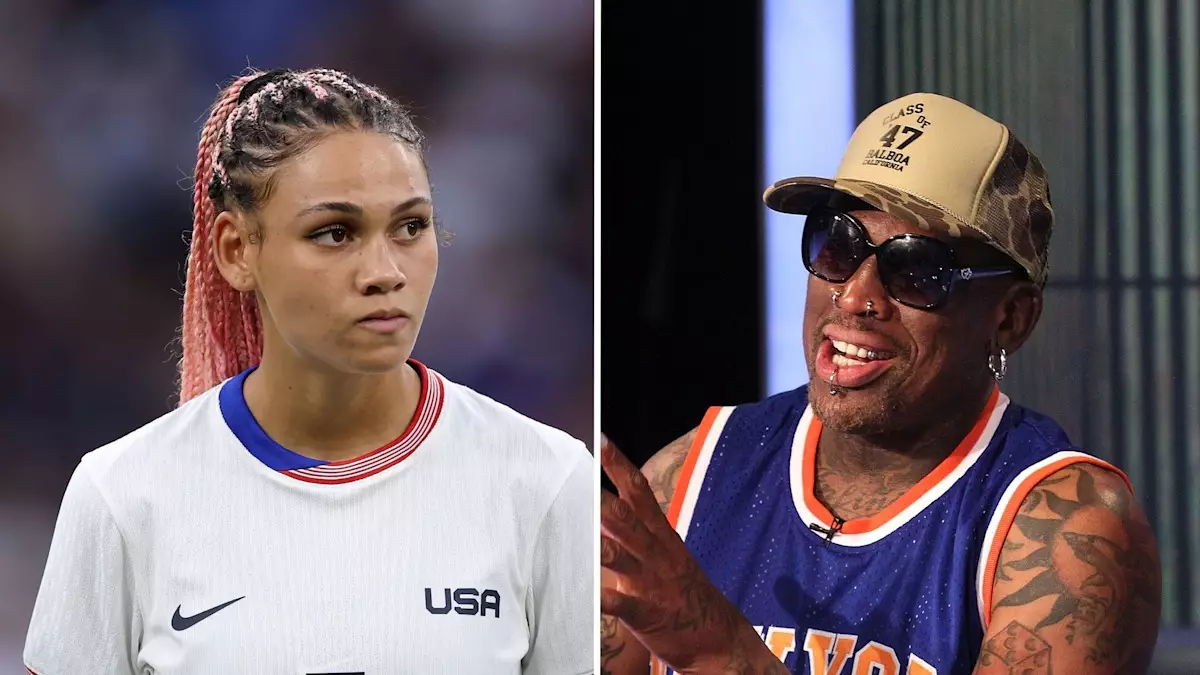The complexity of familial relationships is a theme that resonates deeply with many, and the recent developments surrounding Dennis Rodman and his daughter Trinity offer a poignant glimpse into this reality. The former NBA star, known for his vibrant personality both on and off the court, has faced a significant challenge in his personal life, particularly in his quest to mend a strained relationship with Trinity. This narrative sheds light on Rodman’s tumultuous family history, his failures in parenting, and his earnest attempts to reconnect with his children.
Dennis Rodman’s forays into marriage have been as unpredictable as his athletic career. His first marriage to Annie Bakes in 1992 lasted a mere 82 days, swiftly followed by a brief stint with model Carmen Electra, which ended in annulment just a week after their extravagant Las Vegas wedding. While Rodman’s ball skills brought him fame and fortune, his interpersonal skills within the realm of marriage and parenting seemingly fell short. The emergence of Michelle Moyer into his life marked the start of a more extended association; yet, that relationship also succumbed to similar struggles, with divorce proceedings initiated in 2004.
Trinity, at only 22, has not hesitated to articulate the challenges that have characterized her relationship with her father. In a world where many seek the acceptance and warmth of parental figures, Trinity’s candid remarks provide a stark contrast. She has unflinchingly described her father’s presence during her upbringing, stating, “He’s a person. He’s not a dad.”
The reflections of Trinity and her half-siblings paint a picture of chaotic living conditions that often accompanied Rodman’s lifestyle choices. Recollections of wild parties and a revolving door of acquaintances have left deep impressions. For Trinity, these experiences seem to overshadow any fond memories she may share with her father. She recounts her mother’s strength in navigating a difficult environment, one where Rodman’s priorities and lifestyle clashed dramatically with the needs of his family.
While Trinity openly addresses the emotional and financial turmoil stemming from their family situation, her candidness reveals broader truths about Rodman’s parenting approach, especially concerning finances. Initially providing some financial support, Rodman’s compliance seemed to dissipate during the divorce process, shifting to a dismissive stance that left Trinity and her mother struggling to make ends meet. Her words reflect a common struggle faced by children of high-profile or wealthy individuals—what is perceived as negligence sometimes obscures the ability of a parent to offer meaningful support.
In an effort to bridge the emotional gap between father and daughter, Rodman’s public apology came swiftly after Trinity’s revealing interview. His social media post, accompanied by montage images of Trinity from childhood to present, symbolizes a desperate attempt to reach out. His words, “Sorry I wasn’t the Dad you wanted me to be but either way I still tried,” speak volumes of a father’s regret and longing for approval. The commitment he professes to put forth in trying to mend their relationship, despite the barriers in communication, emphasizes the persistent hope that many parents cling to, regardless of past missteps.
Rodman’s sincere outreach raises fundamental questions about the parent-child dynamic: Can apologies alone mend the fragmented past? Is forgiveness merely an act, or a gradual process? In a society that often celebrates success and reputation, the struggle to gain acceptance from one’s offspring is not just about athletic prowess or financial stability; it’s about emotional availability and genuine connection.
As Trinity continues to carve a successful path in sports—having already made her mark on the U.S. Women’s National Soccer Team—she represents a new generation of athletes who navigate fame, pressure, and personal challenges with grace. Rodman, on the other hand, stands at a crossroads: the journey of rebuilding his relationship with Trinity offers him an opportunity for redemption that transcends his identity as a former basketball player.
In contemplating their future interactions, both father and daughter face the daunting task of overcoming emotional hurdles. Reconciliation will likely require patience, understanding, and perhaps professional guidance to foster an environment where both can express their feelings authentically. Only time will tell if these two can find common ground and forge a more meaningful relationship amid the noise of their shared history and personal stories.
The saga of Dennis Rodman and Trinity encapsulates the challenges many families face, especially when one parent is a public figure. Highlighting the nuances of forgiveness, connection, and healing within familial bonds, it serves as a reminder that despite past transgressions, the hope for reconciliation remains valid. As they navigate this complex journey, the story speaks to the potential for love and understanding, even in situations fraught with disappointment.

